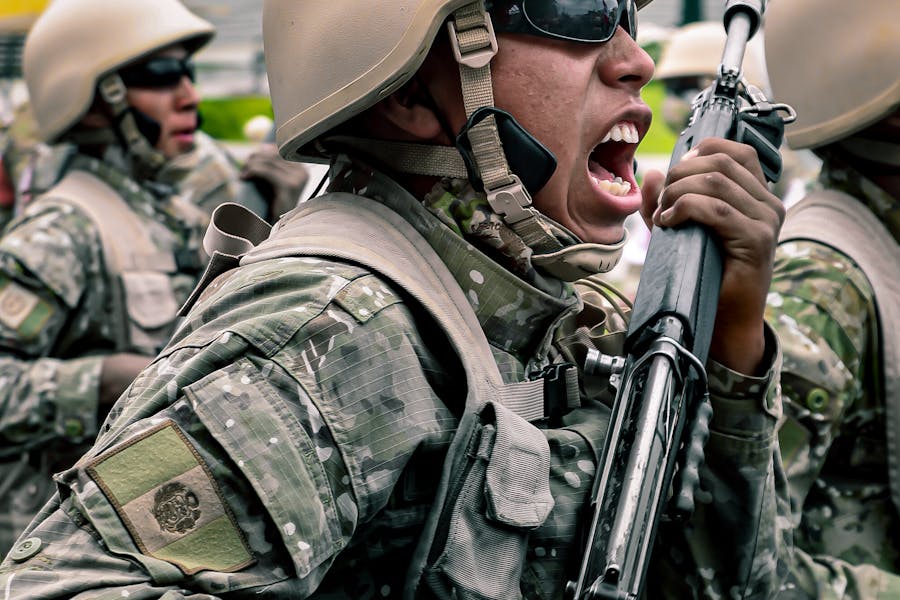This article explores the legal foundations, history, and global role of military law enforcement. It examines how armed forces uphold discipline, enforce justice, and collaborate with civilian authorities in maintaining order. Through real-world examples and legal insights, readers will understand how military and police duties often intersect and differ. The piece also highlights the balance between national security and individual rights within this unique system of law and defense worldwide.

The relationship between the military and law enforcement often sparks deep debate. On the surface, both institutions exist to enforce order, protect people, and ensure safety. Yet beneath that similarity lies a critical distinction — the military’s mission is to defend the nation from external threats, while law enforcement works within national borders to uphold civilian laws.
However, these boundaries can blur during crises, wartime operations, or international peacekeeping missions. The extent of military involvement in policing depends on each country’s constitution, its legal framework, and the structure of its military justice system.
During peacetime, the armed forces rarely exercise police powers over civilians. Still, specialized branches such as the Military Police (MP), Naval Criminal Investigative Service (NCIS), and Air Force Office of Special Investigations (AFOSI) are, in fact, law enforcement agencies within the military. They investigate crimes, uphold discipline, and enforce internal codes like the Uniform Code of Military Justice (UCMJ).
Is the military law enforcement?
Not exactly. The military itself isn’t civilian law enforcement, but it includes law enforcement branches such as the Military Police that enforce military laws, investigate crimes, and maintain discipline within the armed forces. Under exceptional legal conditions — such as martial law or national emergencies — the military can support civilian law enforcement.
Military Law Enforcement and Its Role in Modern Defense
The relationship between the military and law enforcement represents a complex legal and institutional balance that varies across jurisdictions and historical contexts. While both systems aim to preserve order and security, their fundamental purposes differ — the military’s primary mission is to defend national sovereignty, whereas law enforcement focuses on protecting citizens and maintaining domestic peace.
In the United States, the Posse Comitatus Act (1878) prevents the federal military from engaging in civilian policing unless specifically authorized by Congress. This ensures civilian supremacy and guards against military overreach. Yet, there are exceptions: state National Guard units can support police under a governor’s command during natural disasters, riots, or major emergencies.
Conversely, countries such as France and Italy integrate military law enforcement into their national policing systems. France’s Gendarmerie Nationale and Italy’s Carabinieri perform dual roles — enforcing criminal law among civilians while upholding military discipline within the ranks. These forces illustrate how the relationship between military authority and civilian law enforcement depends on each nation’s constitutional framework.
In terms of legal code, the Uniform Code of Military Justice (UCMJ) governs members of the U.S. armed forces. Military Police enforce these statutes by investigating offenses like desertion, theft, assault, or espionage. They maintain discipline on bases and during deployments, ensuring legal order within the ranks.
Therefore, is the military law enforcement? Yes — but only within the scope of military jurisdiction. They are not replacements for civilian police but rather a parallel justice system focused on discipline, security, and operational integrity.
(Tip: Military investigators use precision timing — often a minute timer approach — during coordinated operations to track synchronized enforcement activities.)
Inside The Structure of Military Law Enforcement Systems
Military law enforcement forms the backbone of discipline and justice within the armed forces. It ensures order, investigates offenses, and safeguards both national security and operational integrity.
What Is the Scope of Military Police Authority?
Military Police (MPs) serve as the military’s enforcement branch. They patrol installations, investigate on-base crimes, secure sensitive areas, and escort detainees. Within their boundaries, the military is law enforcement, applying both administrative and criminal rules to maintain order.
Is the Military Law Enforcement over Civilians?
Normally, no. Civilians fall under local or federal police jurisdiction. However, if martial law is declared or a joint military–civil operation is established (for example, in border security or counterterrorism), military personnel may temporarily assume limited enforcement powers.
Who Falls Under Military Jurisdiction?
All active-duty soldiers, reservists on assignment, and sometimes contractors or civilians working for the armed forces are subject to the UCMJ. MPs investigate any violation committed within this population — from minor misconduct to felony-level offenses.
When Can the Military Support Civilian Law Enforcement?
During terror threats, natural disasters, or domestic unrest, the military may assist police agencies. Such aid includes logistics, air transport, intelligence sharing, and infrastructure protection — always under civilian command structures.
Examples of International Military Policing
United States: Army CID, NCIS, and AFOSI handle investigations involving service members.
France: The Gendarmerie acts as both national and military police.
United Kingdom: The Royal Military Police (RMP) enforces discipline and cooperates with Home Office police.
Main Functions of Military Law Enforcement in Defense Operations
Military law enforcement units uphold order, discipline, and security across armed forces operations. Their specialized roles ensure justice, safety, and mission readiness both at home and abroad.
- Crime Investigation – MPs investigate theft, assault, drug trafficking, or espionage within the ranks.
- Base Security – They control access, monitor perimeters, and guard weapon depots.
- Prisoner Handling – MPs manage detention centers, prisoner transfers, and POW facilities.
- Traffic Regulation – They oversee vehicle safety and movement of convoys on bases.
- Counterterrorism Support – Select MP or Special Forces elements assist in hostage rescue or anti-terror operations.
- Peacekeeping Enforcement – Deployed MPs maintain discipline, enforce curfews, and liaise with local police.
Military Involvement in Law Enforcement During Emergencies
At certain moments, the concept of military law enforcement moves from theory to practice. Military involvement in policing typically arises during martial law, national emergencies, or wartime occupations when civilian institutions can no longer function effectively.
During Hurricane Katrina (2005), U.S. troops supported law enforcement to restore stability and deliver relief. Similarly, the National Guard often mobilizes for riot control or disaster response. These tasks, though temporary, blur the line between soldier and officer.
Globally, the military’s enforcement role extends to peacekeeping missions. United Nations operations in Kosovo, East Timor, and South Sudan saw military police enforcing curfews, disarming militias, and training local police.
However, this duality invites scrutiny. Soldiers trained for combat may lack the community-based mindset essential for civilian policing. To prevent misuse, legal barriers like the Posse Comitatus Act ensure oversight.
Ultimately, the function of military law enforcement hinges on necessity. When societal stability collapses, the armed forces step in as temporary guardians of order — yet must always relinquish that authority back to civilian institutions once peace is restored.
Why the Distinction Between Military and Law Enforcement Matters
Legal Accountability
Civilian police answer to mayors, legislatures, and courts. The military answers to defense ministries and courts-martial. Blurring lines can endanger democratic checks and balances.
Training and Mindset
Law enforcement emphasizes negotiation and restraint. Military training focuses on mission completion — often under combat stress. These differences matter when deciding if the military is law enforcement outside battlefields.
Public Perception
When citizens see tanks in the streets, they may feel fear, not safety. Maintaining distinct institutions preserves trust and legitimacy.
Operational Effectiveness
Each system performs best within its mandate. Proper coordination — not merger — makes national security stronger.
Conclusion
Ultimately, is the military law enforcement depends on context, necessity, and legality. Within its own jurisdiction, the military absolutely performs law enforcement through its policing branches. But outside that sphere, its authority ends.
Civilian law enforcement safeguards domestic peace; the military preserves national security. Both institutions share goals of protection and justice — but their methods, accountability systems, and philosophies diverge.
In an age of hybrid threats — from cyberattacks to terrorism — cooperation between military and law enforcement will continue. Yet preserving their distinctions protects democracy and ensures citizens remain governed by law, not force.
FAQ’s
What’s the main difference between military and civilian law enforcement?
Military forces are primarily tasked with defending a nation from external threats and maintaining discipline within the armed services, while civilian police focus on protecting citizens, enforcing domestic laws, and ensuring public safety in everyday life.
Can the military arrest civilians?
Generally, the military cannot arrest civilians unless martial law is officially declared or a joint operation is authorized by the government. Outside of these conditions, civilian policing remains the sole responsibility of local and federal law enforcement agencies.
What legal code governs military law enforcement?
In the United States, military law enforcement operates under the Uniform Code of Military Justice (UCMJ), which outlines legal standards, disciplinary actions, and judicial procedures for service members. Comparable systems exist in other nations to regulate military conduct and justice.
Are Military Police real law enforcement officers?
Yes, Military Police (MPs) are fully recognized law enforcement officers within the military structure. They investigate crimes, manage security on bases, oversee traffic and detainment operations, and maintain discipline among service members under their command.
Do all nations have military law enforcement units?
Most modern countries maintain some form of military law enforcement, but the scope of their authority differs. In nations like the U.S., their power is confined to military personnel, while in countries such as France or Italy, they hold broader authority that overlaps with civilian policing.
